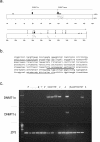Lack of involvement of known DNA methyltransferases in familial hydatidiform mole implies the involvement of other factors in establishment of imprinting in the human female germline
- PMID: 12546714
- PMCID: PMC149328
- DOI: 10.1186/1471-2156-4-2
Lack of involvement of known DNA methyltransferases in familial hydatidiform mole implies the involvement of other factors in establishment of imprinting in the human female germline
Abstract
Background: Differential methylation of the two alleles is a hallmark of imprinted genes. Correspondingly, loss of DNA methyltransferase function results in aberrant imprinting and abnormal post-fertilization development. In the mouse, mutations of the oocyte-specific isoform of the DNA methyltransferase Dnmt1 (Dnmt1o) and of the methyltransferase-like Dnmt3L gene result in specific failures of imprint establishment or maintenance, at multiple loci. We have previously shown in humans that an analogous inherited failure to establish imprinting at multiple loci in the female germline underlies a rare phenotype of recurrent hydatidiform mole.
Results: We have identified a human homologue of the murine Dnmt1o and assessed its pattern of expression. Human DNMT1o mRNA is detectable in mature oocytes and early fertilized embryos but not in any somatic tissues analysed. The somatic isoform of DNMT1 mRNA, in contrast, is not detectable in human oocytes. In the previously-described family with multi-locus imprinting failure, mutation of DNMT1o and of the other known members of this gene family has been excluded.
Conclusions: Mutation of the known DNMT genes does not underlie familial hydatidiform mole, at least in the family under study. This suggests that trans-acting factors other than the known methyltransferases are required for imprint establishment in humans, a concept that has indirect support from recent biochemical studies of DNMT3L.
Figures

References
-
- Li E, Bestor TH, Jaenisch R. Targeted mutation of the DNA methyltransferase gene results in embryonic lethality. Cell. 1992;69:915–26. - PubMed
-
- Mertineit C, Yoder JA, Taketo T, Laird DW, Trasler JM, Bestor TH. Sex-specific exons control DNA methyltransferase in mammalian germ cells. Development. 1998;125:889–97. - PubMed
Publication types
MeSH terms
Substances
LinkOut - more resources
Full Text Sources
Medical
Molecular Biology Databases

